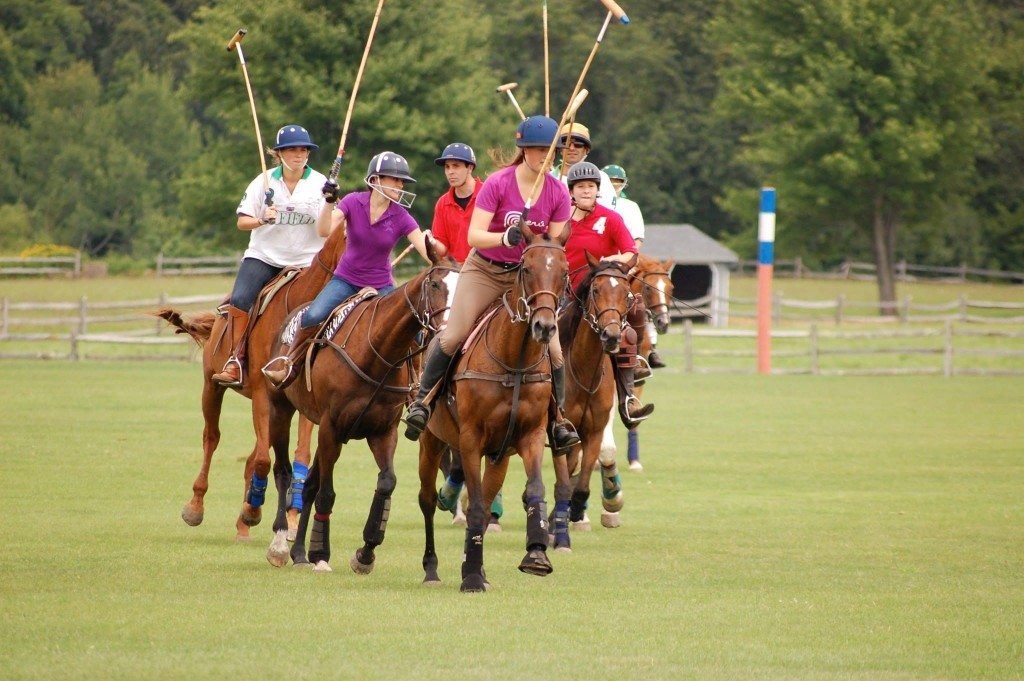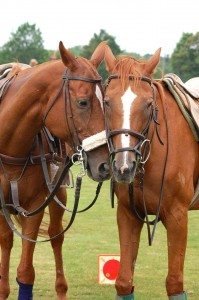Special for the Armenian Weekly
A rumble as thousands of pounds of horses come racing down the field at 35 mph; yelling; a ball goes whizzing by spectators as mounted warriors’ sticks clash. This could be a scene from 1,000 years ago on an Anatolian plateau, or it could be the scene found in Massachusetts at a Sunday polo match. The game has not changed much over the past several thousand years, nor has the scene of brightly dressed spectators coming out to mingle and gaze at the theatrics. It is still a melting pot of royalty, dedicated players who have clawed their way into the spotlight, and peers who have bought or leased a horse or two to run around the field in the summer. Though polo is the Sport of Kings, it has also always been a sport for the people.

The earliest records of polo are from the time of Persian King Darius the great (522-486 B.C.), chronicling a match between Turkomans and Persians (Turkomans won). By the 16th century, polo fields throughout the Middle East and India were being built with the same specifications—300 yards long with goalposts 8 yards apart. Many of these fields can still be found. Even in these early matches, thousands of people would gather to see the games. The earliest records of Armenians playing polo are from the 4th century A.D., narrating the matching between the Armenian Princess Shireen and Sassanid King Kosrow II, romanticized in the Persian Epic Poem “Khosrow and Shireen.” The Byzantines were also avid polo players, with reports of Armenians playing with the Persians. Byzantine Emperor Cantacuzenus is one of the most notable casualties of the sport, dying from a polo accident in 1347 A.D.

My grandfather always told stories about his family’s horses in Armenia and on the farm they owned in central Massachusetts. They were large work horses, used for plowing fields and pulling wagons. I never imagined that my line of work would also be dependent upon horses. I rode horses a couple of times at camps when I was young, but my first encounter with polo—and interest in horses—was at the University of Connecticut. After witnessing a match, I was convinced by the coach to sign up for polo lessons offered through the school. Lucky for me, being able to ride was not as important as being willing. At UConn, I had the opportunity to travel around the country competing against other schools. With a degree in economics and unimpressed by desk jobs, I found some work in various assignments associated with the sport. I started off grooming for professional players and soon was offered a job managing my first polo club.

While managing various clubs I developed a string of horses. I had always wanted to return to the Boston area to run a polo club, and several years ago I got a job managing the operations of Myopia Polo Club in Hamilton, Mass. Myopia did not offer any training to new players, so it was a natural step for me to start up my polo school while at Myopia. My polo school offers private and group lessons, and organizes local matches and tournaments. In the summer I also take players to compete in locations such as Newport, R.I., Saratoga, N.Y., Vermont, and Connecticut, to name a few. Many of the individuals I teach polo to have never ridden a horse before. The horses can tell if you are a beginner or an advanced player, and they take care of their riders equally. They are like very smart, large, and loyal dogs who know their job. Horses that do not like polo do not last, as they will misbehave and not be safe, so very quickly they will find other jobs such as jumping or western riding. Polo is very safe for the horses; the horses know the game and know what is dangerous, and will not allow themselves to go in dangerous situations that will risk horse and rider. It is also much easier on the horses’ bodies than other sports such as jumping, and it is common to find polo ponies competing in the highest levels, including the U.S. Open, into their 20s (where usually by the early teens horses used for jumping develop joint issues and cannot continue at such levels).
Polo is referred to as a very addictive sport. For me, I was first addicted to the thrill of sitting atop a huge living animal, trying to get them to listen to me while playing a sport similar to hockey. Now my “addiction” is my love of taking care of these horses, who put so much trust in me and my clients, and to share this feeling with others. The trust and relationship you develop with the horses is like no other, and both feed off of each others’ feelings. I especially take pride in thinking that I am playing a nearly identical sport to my ancestors thousands of years ago, and developing the same connections they developed with their horses and players visiting from far off lands.
It would be my pleasure to have you join me in this experience.
Mark Tashjian can be reached by e-mail at mark.tashjian@yahoo.com or by phone at (508) 735-6416. To learn more about the Boston Polo School, visit www.bostonpolo.org.


Polo is a great sport to play and watch. One of the greatest contemporary players is Argentinian Nacho Figueras.
Darius the Great must have had a polo match with Central Asians from Turan who spoke an Indo-Iranian language, as at his time, the Turkic peoples were up in Mongolia.
http://en.wikipedia.org/wiki/Turan
http://en.wikipedia.org/wiki/Turkic_peoples#History
http://en.wikipedia.org/wiki/Turkmen_people#Origins
http://en.wikipedia.org/wiki/Shahnameh#On_Turkic_identity
Mr Tashjian, wherever you got your information from, I think it was a poor choice of words to state “the earliest record” as if it really was and next use “Turkoman”, and present it as if it really did take place. there was no such thing as “Turkoman” in 500 BC, and the so-called match that supposedly took place was written 1500 years after Darius, and obviously it is all fantasy. The history of polo is not exactly known, and for all we know it could have originated in Artsakh.
One thing we do know, it was a sport of the Aryan people, not Turanian and of course, the ridiculous Azeris are busy on wikipedia spreading their disinformation to establish a history for themselves to be connected to Turkmens, Turkomans, etc which is why they recently claimed polo was a “historic sport of Azerbaijan”. As usual, Armenians sit back and watch while their culture is swindled from them before their eyes.
Sorry Mr Tashjian, but if it was Darius who played then the so called Turkomens might have been Armenians??!!The reality is polo is a pure Armenian sport and we taught it to the Byzantines for sure. However, recent slaughter of hundreds of armenian horses under soviet rule decimated our sport. In fact some of those horses came from Arabia and were owned by Armenians from the Middle East.
Nice article Mark and congratulations for pursuing your dream outside of being a corporate zombie, rare amongst todays youth.
OK MARK,
What a wonderful article. Bravo for your following you dream. Now how about playing the sport in its proper homeland?!
Armenia is ready for a renaissance in Polo. And Vahakni — http://www.vahakni.com is ready to host a match! Come over, start a program and we’ll get you some students! There is a wonderful horseback riding center called Aryudzi in Ashtarak near here, and it is quite popular. I think Armenians would be delighted to resurrect our ancient sport right here in the homeland. With your help and guidance we can make this dream come true!
Please feel free to contact us!
Cheers,
Nina